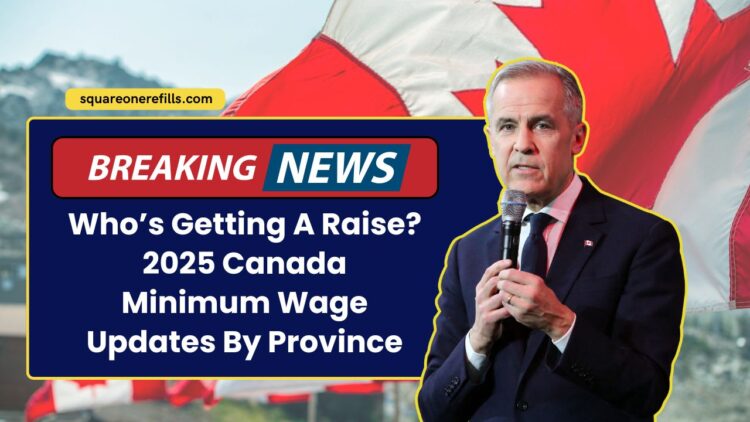As the cost of living continues to rise across Canada, minimum wage rates are being adjusted in 2025 to help hourly workers keep up. These changes aim to maintain purchasing power and ensure that wages reflect the impact of inflation, rent increases, and food prices.
If you’re paid hourly, these wage hikes could directly affect your paycheck. Let’s break down the latest minimum wage updates by province, including timelines, expected increases, and the broader economic outlook.
Minimum Wage Policy in Canada
Canada doesn’t have a universal minimum wage. Instead, each province and territory sets its own hourly rate based on regional economic conditions and inflation.
There is also a federal minimum wage (currently $17.30/hour), which applies only to employees in federally regulated sectors such as:
- Banking
- Postal services
- Interprovincial transportation (e.g., trucking, rail)
Most provinces and territories update their wage rates annually, typically based on the Consumer Price Index (CPI). This adjustment helps align earnings with real-world costs, including rent, groceries, and fuel.
2025 Minimum Wage Overview
Here’s a snapshot of the overall wage trend for 2025:
| Category | Details |
|---|---|
| Current Average Wage | ~$17.30/hour (national average) |
| Effective Raise Date | Most start on April 1, 2025 |
| Expected National Hike | Around 3.4%, aligned with CPI |
| Wage Drivers | Inflation, regional CPI, cost of living |
Minimum Wage Updates by Province in 2025
April 1, 2025
| Province/Territory | Old Wage | New Wage |
|---|---|---|
| New Brunswick | $15.30 | ~$15.77 |
| Nova Scotia | $15.00 | $15.40 |
| Newfoundland & Labrador | $15.60 | $15.91 |
| Yukon | $17.59 | ~$17.97 |
May 1, 2025
| Province | Current Wage | Update |
|---|---|---|
| Quebec | $15.75 | New rate to be announced |
June 1, 2025
| Province | Current Wage | Update |
|---|---|---|
| British Columbia | $17.40 | Increase confirmed, TBD |
September 2025
| Territory | Current Wage | Update |
|---|---|---|
| Northwest Territories | $16.05 | Increase pending |
October 1, 2025
| Province | Old Wage | New Wage (Estimated) |
|---|---|---|
| Ontario | $17.20 | ~$17.82 |
Each province uses local CPI metrics to determine the new rate. While some rates are finalized, others will be officially confirmed in the coming months. Workers are encouraged to check their provincial labor websites for real-time updates.
Impact of the Minimum Wage Increases
For Workers
- More take-home pay to offset rising rent, fuel, and food prices
- Improved quality of life for low-income earners
- Greater access to essentials without relying on debt
For Businesses
- Potential increases in labor costs, especially for small businesses
- May lead to price adjustments, fewer hours, or slower hiring
- Could boost employee retention and productivity
For the Economy
- Consumer spending rises, potentially boosting local economies
- Inflationary pressures may persist, requiring careful balance
- Wage hikes serve as a buffer against economic inequality
Future Outlook for 2025 and Beyond
As inflation remains a concern in 2025, more provincial governments are likely to tie future wage hikes directly to cost-of-living indexes. This ensures that wages stay relevant, fair, and sustainable over time.
Expect more real-time adjustments in 2026 and beyond, possibly with sector-specific minimum wages in high-cost industries such as food service, gig work, and healthcare.
In 2025, millions of Canadian workers will see a pay raise thanks to provincial minimum wage increases aimed at keeping pace with the rising cost of living. These updates reflect a larger effort to protect the real value of wages, especially for those most vulnerable to inflation.
Whether you’re a cashier, delivery driver, server, or retail worker, knowing your province’s wage update timeline could help you plan better, budget smarter, and even negotiate for more.
As the economic landscape continues to shift, staying informed will be key to making the most of every dollar earned.
FAQs
Does the federal minimum wage apply to all Canadian workers?
No. The federal minimum wage applies only to federally regulated employees. All other workers follow the minimum wage set by their province or territory.
Can provinces raise their minimum wage more than once a year?
Yes. While annual reviews are common, provinces can make additional changes due to emergency inflation or labor market shifts.
How can I find out when my province is updating the rate?
Check your province’s official labor department or employment standards website. They provide up-to-date announcements, rates, and enforcement policies.

